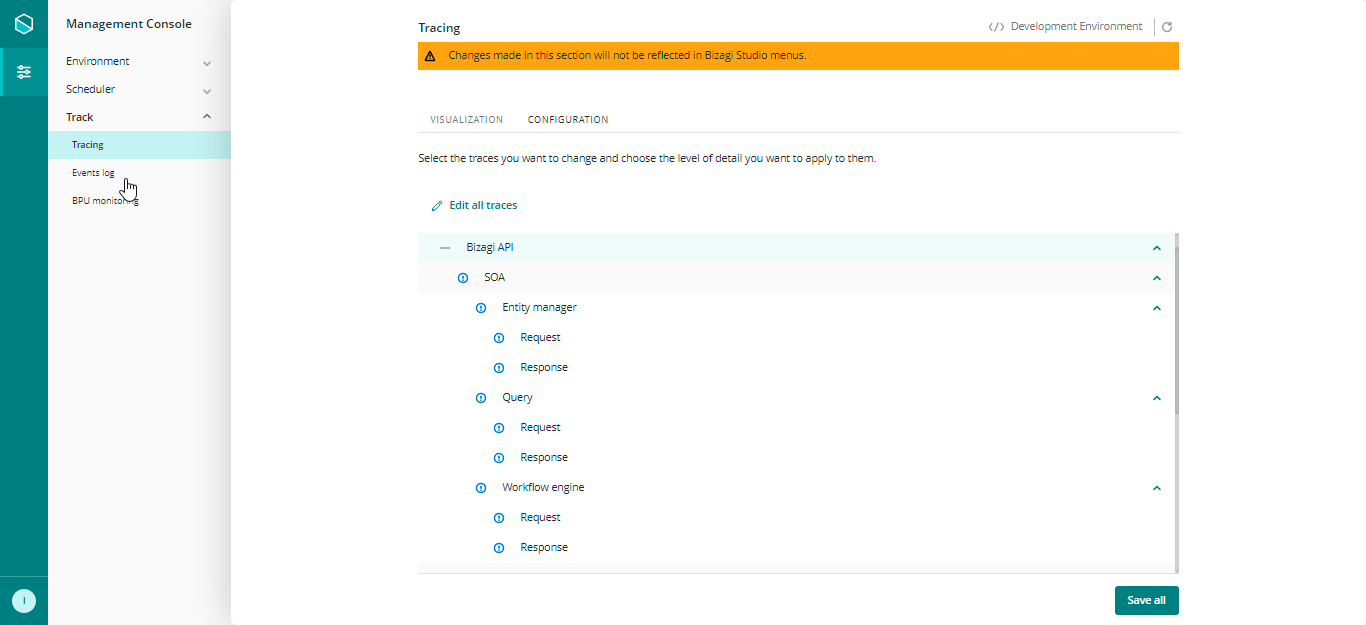Overview
When configuring SOA invocations in Bizagi, you may rely on the use of traces for error control and diagnostics.
Traces let you detect whenever there is an issue with the SOA invocation and retrieve further detail.
SOA traces
Whenever you are debugging an SOA invocation (in Development environments) or whenever you wish to retrieve further detail about a failed invocation, you may choose to turn on the SOA traces.

|
Keep in mind that SOA traces can be enabled at any time; however, it is strongly recommended to enable them only temporarily when needed, and to disable them afterward.
Changes in this configuration will most likely require a reset in your Bizagi server's services. |
Enabling these traces is useful to track down, after an error in the application, the exact point where said error has happened. There are five points where detail is logged and you may diagnose if there is a problem with your bot's invocation, or whenever transformations were being applied to the information.
Types of traces
SOA traces are divided in three categories for the following methods:
•EntityManagerSOA
•WorkflowEngineSOA
•QuerySOA
The following traces are logged with a chronological order, as detailed in the tables below:
Entity Manager |
||
|---|---|---|
Chronological order |
Trace type |
Description |
1 |
Request |
Creates a .log file with the inputs sent to the robot before the execution of its logic. Its name has the following convention: BizagiAPI_SOA_EntityManager_Request[TimeStamp].log Note that timestamp is set as yyMMddHHmmss |
2 |
Response |
Creates a .log file with the outputs received from the robot before any transformation done by Bizagi. Its name has the following convention: BizagiAPI_SOA_EntityManager_Response[TimeStamp].log Note that timestamp is set as yyMMddHHmmss. |
Workflow Engine |
||
|---|---|---|
Chronological order |
Trace type |
Description |
1 |
Request |
Creates a .log file with the the inputs sent to the robot before the execution of its logic. Its name has the following convention: BizagiAPI_SOA_WorkFlowManager_Request[TimeStamp].log Note that timestamp is set as yyMMddHHmmss |
2 |
Response |
Creates a .log file with the the outputs received from the robot before any transformation done by Bizagi. Its name has the following convention: BizagiAPI_SOA_WorkFlowManager_Response[TimeStamp].log Note that timestamp is set as yyMMddHHmmss. |
Query |
||
|---|---|---|
Chronological order |
Trace type |
Description |
1 |
Request |
Creates a .log file with the the inputs sent to the robot before the execution of its logic. Its name has the following convention: BizagiAPI_SOA_QueryManager_Request[TimeStamp].log Note that timestamp is set as yyMMddHHmmss |
2 |
Response |
Creates a .log file with the the outputs received from the robot before any transformation done by Bizagi. Its name has the following convention: BizagiAPI_SOA_QueryManager_Response[TimeStamp].log Note that timestamp is set as yyMMddHHmmss. |
Last Updated 5/13/2025 3:45:10 PM